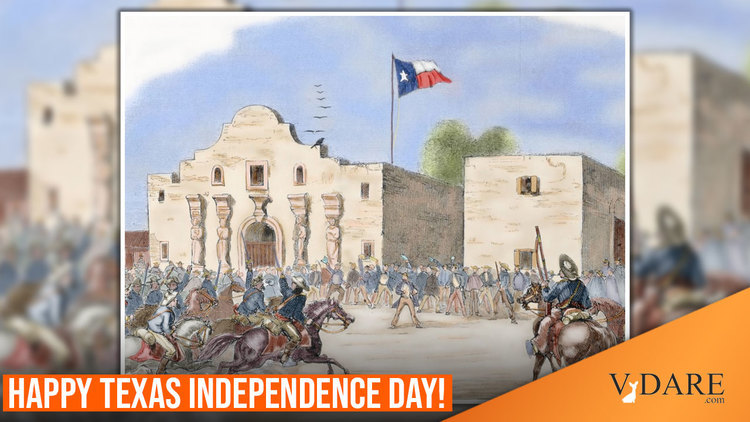


03/02/2006
Texas Independence Day is today. Lawrence Simon in Houston points to this story:
Hispanics, most of them of Mexican descent, surpassed Anglos as the largest ethnic group in the city in the 2000 census and are about 42 percent of the population. One of every three Texans is Hispanic, and they want a review of the Anglo-centric history the state has long celebrated. [TEXAS INDEPENDENCE DAY 1836: The battle then and now By LORI RODRIGUEZ, Houston Chronicle, March 2, 2006]
Simon says
Okay, fine. Instead of teaching "We won" we're more than happy to amend it.
Does "We won, you lost" sound good?
Here is some what what VDARE.com has done in the past on Texas history:
And check out this aside on the consequences of immigration from the point of view of the Spanish Empire:
Forty-four years ago, Richard Weaver published a book the title of which, at least, convinced the conservative movement: Ideas Have Consequences. It is now time to recognize a further truth: Immigration Has Consequences.
The crudest consequences relate to political power. Because many libertarians and economic-growth conservatives are so reluctant to admit this logical possibility, it is worth emphasizing that there are plenty of examples of immigrants and their descendants threatening the political balance of a state (polity), from the Uitlanders in the nineteenth-century Boer Republics to the Indian politicians recently elected to govern Fiji and promptly deposed by the ethnically Fijian army. And how about this chilling comment from the Harvard Encyclopedia?
In obtaining land grants in Texas, Anglo immigrants agreed to become Mexican citizens, obey Mexican laws, accept the official Catholic faith, learn Spanish, and take other steps to become fully assimilated as law-abiding citizens. However, over the years, it became clear that these settlers, now Anglo-Mexicans, were not becoming integrated into the nation and that Anglo immigration had become a problem … The strains and disagreements ultimately led to the Texas Revolution in 1835.
Er, quite. [Time to Rethink Immigration?, by Peter Brimelow, June 22, 1992]